BEIJING, Dec. 25 -- The Communist Party of China (CPC) has vowed to firmly fight corruption and maintain its "high-handed posture" in the next five years.
"If the problems of work styles and corruption are not handled properly, they will critically harm the Party, and even lead the Party or nation to perish," said a five-year (2013-2017) plan on building a system to punish and prevent corruption, issued by the CPC Central Committee on Wednesday.
All cases must be investigated and miscreants punished more severely to deter others, the plan said.
The CPC reiterated its pursuit of "tigers" and "flies" and the fight against harmful work styles, the hotbeds for corruption. The Party's work style campaign is fundamental to the fight against corruption, according to the document.
"Corruption is still common. The soil that nourishes corruption still exists. The situation remains critical and complicated," the plan said.
"The report showcases the Party's resolution in combating corruption in the next five years, focusing on both solving problems on the surface and eradicating their roots," said Ma Huaide, vice president of China University of Political Science and Law.
Within five years, "public satisfaction should be achieved," according to the plan.
For the CPC, building an anticorruption system is a "major political task, while for society it is a common responsibility.
The plan was hailed by the CPC Central Committee as an important guide in the fight against harmful work styles and corruption until 2017.
Under the new conditions, the Party faces multiple tests in governance, reform, opening up and developing the market economy as well as tests from the external environment, it said.
The whole Party is confronted with increasingly grave dangers of lack of drive, incompetence, being out of touch with the people and corruption.
Particular efforts should be made to deal with cases involving power-for-money deals, judicial corruption, major violations of political discipline, mass incidents and major accidents which happened because of corrupt officials, commercial bribery, and official selection, the plan said.
"Top-level design is a must if we want the anti-corruption drive to be efficient," said Jiang Ming'an, professor with the Peking University's Law School.
According to Jiang, the report is such an integrated and coordinated effort to ensure that officials dare not, cannot and will not easily commit corruption.
The CPC has been severe on corruption, with some 108,000 officials punished in the first nine months of this year.
The CPC confirmed on Wednesday that Li Dongsheng, former vice minister of public security, had been removed from his various posts for "suspected serious disciplinary violations."
The report urged strengthened intra-Party supervision and extra effort in regulating the use of power, by ordering officials to submit reports annually on how their new, clean work styles.
It also urged giving anti-graft education a key role in the study campaign for Party members and officials, with a focus on law, discipline, morality and typical corruption cases to warn them of the consequences.
According to the report, anti-graft should also be a significant theme for public cultural activities and products as well as major media outlets to guide public opinion and promote a fine social ethos.
It called for an improved legal system to ensure effective implementation of various anti-decadence regulations, citing those concerning the use of public vehicles, the construction of office compounds, business receptions and overseas trips.
Jiang stressed that legislative efforts must be stepped up and gradually replace documentary stipulations as the leading force against corruption.
Anti-graft supervision should also extend to the courts and procuratorate systems to ensure independent and lawful investigating and rulings.
Inviting scrutiny from various walks of life, the report asked local government departments at all levels to step up publicity of their budgets and work.
Experts have stressed the regulation of power and transparency of work as a premise for anticorruption to prevent officials from disregarding rules and procedures.
The report highlighted the key roles of Party and disciplinary committees in enforcing the anticorruption campaign, reiterating an inspection system where disciplinary officials in key Party and government organs were vigilant against misconduct.
The report stressed that both officials with questionable behavior and supervision personnel failing to spot problems and enforce the campaign will be punished, in the hope for a "shock and awe" effect.
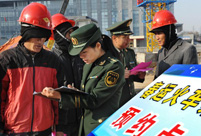 People prepare for upcoming 'Chunyun'
People prepare for upcoming 'Chunyun'  Highlights of Beijing int'l luxury show
Highlights of Beijing int'l luxury show Record of Chinese expressions in 2013
Record of Chinese expressions in 2013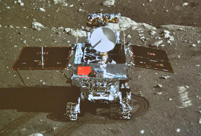 China's moon rover, lander photograph each other
China's moon rover, lander photograph each other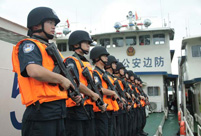 17th joint patrol of Mekong River to start
17th joint patrol of Mekong River to start Spring City Kunming witnesses snowfall
Spring City Kunming witnesses snowfall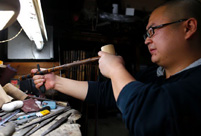 Heritage of Jinghu, arts of strings
Heritage of Jinghu, arts of strings Weekly Sports Photos
Weekly Sports Photos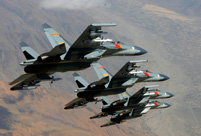 PLA elite units unveiled
PLA elite units unveiled  China's stealth fighters hold drill over plateau
China's stealth fighters hold drill over plateau Chinese navy hospital ship's mission
Chinese navy hospital ship's mission  "Free lunch" program initiated in NW China
"Free lunch" program initiated in NW China  Rime scenery in Mount Huangshan
Rime scenery in Mount Huangshan DPRK's Kaesong Industrial Complex
DPRK's Kaesong Industrial Complex 'Jin' named the word of the year
'Jin' named the word of the year Day|Week|Month